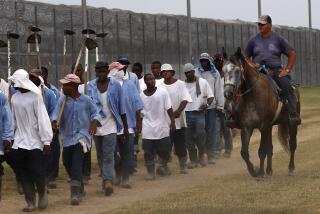Rancher Will Be Sentenced Over Labor Violations : Somis: Edwin M. Ives, 57, could be placed on probation today or imprisoned up to 16 years for seven charges in connection with his treatment of Mexican farm workers.
- Share via
Nearly 3 1/2 years after Edwin M. Ives was first charged with enslaving farm workers, the Somis rancher is scheduled today to be sentenced on seven criminal violations of labor and immigration law.
U.S. District Judge Consuelo B. Marshall could place Ives, 57, on probation or sentence him to a maximum of 16 years in prison.
Prosecutors argue for a 15-year prison sentence, saying a stiff sentence would set an example for other abusive employers and improve conditions for farm laborers. But defense lawyers insist that Ives was a good employer to whom workers returned year after year.
Though the slavery charges were dropped in a plea bargain last year, the government still maintains that Ives virtually imprisoned laborers recruited from rural Mexican villages during the 1980s, forcing them to work for sub-minimum wages and buy the necessities of life at inflated prices from a company store.
“For all the wretchedness of the lives that were at his mercy, he must bear the fullest responsibility,” said Assistant U.S. Atty. Carol L. Gillam last week in a memo to the judge. “His repeated attempts to trivialize the seriousness of his offense should be rejected.”
But Ives’ lawyer, Robert Talcott, argued that the $1.5-million fine Ives has agreed to pay constitutes a punishment harsher than any ever paid by an employer for similar offenses. And Talcott insisted that Ives is a victim of government prosecutors who filed charges far more serious than were justified.
“They started out with this ill-conceived, unfounded allegation (of slavery) and gave this case greater importance than it ever, ever deserved,” Talcott said.
Marshall is expected to sentence Ives immediately after a 3 p.m. hearing in federal court in Los Angeles, attorneys said.
Ives, 57, of Los Angeles, pleaded guilty last year to corporate racketeering, the federal government’s first organized-crime conviction in a civil rights case. He also agreed to pay $1.5 million in back wages to 300 former workers, the stiffest fine ever levied in a U.S. immigration case.
Ives also personally admitted to seven labor and immigration crimes, including harboring and transporting illegal immigrants, failing to pay minimum wages and overtime and forcing workers to buy equipment from him that was necessary for their jobs.
In exchange for Ives’ plea, the U.S. attorney’s office agreed to dismiss extortion and peonage counts that brought the case notoriety as the largest slavery prosecution in U.S. history when it broke in 1990.
Defense attorneys argue in hundreds of pages of pre-sentencing documents that Ives has already suffered enormously and could pay his debt to society without going to prison.
“Irrespective of the sentence he will eventually receive, Ed Ives has already been singled out for harsher prosecution than virtually any other agricultural employer who is caught in similar circumstances,” the defense argues in a report to Marshall.
“The violations Ed has admitted making . . . were commonplace in agriculture during the 1980s,” the report says. “His sins were the sins of an entire industry.”
Also cited prominently by defense attorneys are more than 250 letters of support from people arguing for a lenient sentence.
Friends, relatives, business associates, several pastors and rabbis, members of Ives’ temple and neighbors in Somis and the Fairfax area of Los Angeles have all vouched for the rancher’s good deeds and integrity, lawyers said.
The sentencing report depicts Ives as a model father and husband who has contributed heavily to charitable causes.
Joseph P. Rosenblatt, associate director of the UCLA AIDS Institute, states in a letter that he “can recall no other instance in which I feel there is such a dichotomy between what I know of a man’s character and the nature of the charges leveled against him.”
Rosenblatt said Ives made an unsolicited $18,000 donation to a new children’s hospital in Israel in 1989, with the only condition being that Ives not be identified as the donor.
Rabbi Marvin Hier, dean of the Simon Wiesenthal Center, recommends a sentence of community service.
“He has a reputation in our community as being a kind person, responsive to those less fortunate and an active participant in community affairs,” Hier writes. “He is a deeply religious person and, I am sure, is now engaged in religious introspection. His life will never be the same!”
Two agencies have offered to sponsor Ives’ community service, according to the sentencing report. One would use Ives to help start a flower business at a re-entry center for Jewish alcoholics and criminals. At the second, he would help newly arrived Haitian immigrants find work in the Los Angeles area.
Prosecutors, however, insist that community service would be a slap on the wrist. Only a severe sentence would force the rancher to accept the seriousness of his crimes, they argue.
Ives’ comments show “a continuing affirmation of his essential belief that he is better than those who work or him, too powerful for the full force of law to apply to him,” Gillam argues. “Edwin Ives is too self-absorbed to see that his greed had far-reaching consequences of a most inhumane nature.”
Since he was arrested in April, 1990, prosecutors have charged that Ives--a grower of ornamental plants and flowers--became a millionaire by mistreating some of the hemisphere’s poorest and most vulnerable inhabitants.
He recruited Zapotec and Mixtec laborers from the rural mountaintops of southern Mexico, smuggling them into the country and allegedly imprisoning them behind locked gates and high fences at his 50-acre Somis compound.
Prosecutors charge that Ives enslaved hundreds of workers at his compound between 1984 and 1990, first by forbidding them to leave until smuggling fees were paid and then by threatening to turn them in to immigration agents if they fled.
More than 100 workers have testified or declared in statements that they lived in slave-like conditions at Ives’ Somis ranch.
Defense attorneys argue, however, that they also located 100 witnesses ready to testify that Ives was a good employer and treated them well.
They insist the rancher’s guilty plea was extorted by the government’s over-filing of charges and by its charges against Ives’ wife, Dolly, which were later dropped. They insist former workers turned on Ives because they saw the chance of getting thousands of dollars in restitution.
At sentencing, Ives is prepared to hand over $1.5 million, most of it coming from the recent sale of a 10-acre Upland grove to the California Department of Transportation for a new freeway, attorneys said. About 300 workers are eligible for payments, which could range from a few hundred dollars to $30,000, depending on length of employment.
Twenty-nine of the workers also will receive payments of undisclosed amounts in a civil lawsuit filed by the California Rural Legal Assistance lawyers in Oxnard. Settlement has been reached, said CRLA attorney Lee Pliscou, and payment will be made after sentencing.
Ives, seven ranch foremen, a recruiter and a smuggler all have pleaded guilty in the case, and three have been sentenced.
Smuggler Mauro Casares, 66, of Oxnard received the stiffest penalty so far--18 months in prison and $13,443 in restitution. He admitted charging each Mexican laborer he brought to Ives $435 for transportation and phony immigration documents.
More to Read
Sign up for Essential California
The most important California stories and recommendations in your inbox every morning.
You may occasionally receive promotional content from the Los Angeles Times.













